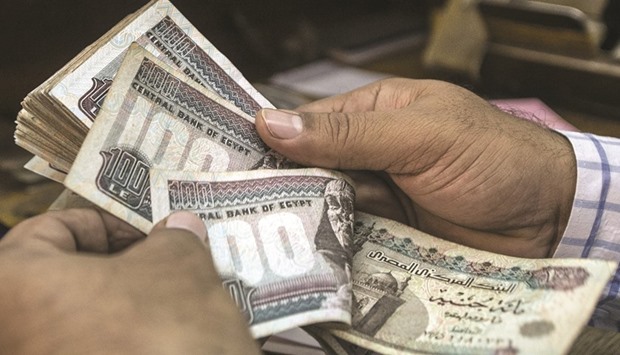If Egypt can learn anything from emerging markets that have abandoned control of their currencies, it’s that a half-hearted approach is bound to fail.
The North African country on Thursday became the latest developing nation to announce a free float in the past two years, unleashing a 45% slide in the pound to 16 per dollar, according to quotes from six banks including Commercial International Bank Egypt. Whether the move eases the dollar crunch and quashes the black market will depend on how committed the central bank is to staying hands-off when currency swings ensue.
If the experience of countries like Russia, Kazakhstan and Argentina is anything to go by, the initial pain will be worth it in about a year’s time, according to David Hauner, a strategist at Bank of America Corp. A weaker currency not only makes Egypt’s exports more competitive, it also boosts the country’s appeal for tourists and eases pressure on the central bank to drain reserves that have slumped since the Arab Spring.
“Anything that is in-between, in particular any pegs that lack credibility due to a lack of reserves and are far removed from fair value, are a bad option,” Hauner said from London. “This adjustment is never easy. There is clearly a period where things get worse, but when you look at the experience of countries that have moved to a free-float, it has proven to be beneficial.”
For a country like Egypt that’s always managed its exchange rate, the transition will be tough. This is especially the case as soaring import costs will spur inflation and make lives harder for the 92mn citizens whose per-capita income is among the lowest in the Middle East and North Africa.
Yet anything other than a complete break is destined to fail. When policy makers fiddle with the exchange rate, black-market activity inevitably surges, as Nigeria’s experiment with a free-float attests. It can also be costly. Russia spent about $90bn defending the rouble against short-sellers in 2014 before ultimately giving up in November that year.
Even in Egypt, attempts to manage the pound rather than unshackle it completely in 2003 and earlier this year led to soaring unofficial trading and prompted individuals and companies to hoard dollars because they lacked confidence in the currency’s stability.
Below is a summary of how five emerging markets fared after they removed currency pegs.
Russia
What happened? Russian Central Bank Governor Elvira Nabiullina abandoned currency interventions in November 2014 as the country grappled with sanctions and a slump in the price of oil, its main export. The rouble, which rebounded this year, is still down about 32% since then.
Was it effective? Two years on, implied three-month rouble volatility has fallen to levels last seen before the free-float, inflation expectations are coming down, net capital outflows have slowed and Nabiullina has been lauded as Europe’s most-orthodox central banker. What’s more, households have lost interest in currency swings and are keeping 60% of their savings in roubles, according to a poll released in August.
Kazakhstan
What happened? Policymakers decided on August 20, 2015, to match devaluations by China and Russia, its neighbours and biggest trading partners. The tenge has since tumbled 42%.
Was it effective? After the move, the country’s central bank was forced to spend at least $1.7bn, or 6% of reserves, to smooth swings in what became the world’s most volatile currency. A year later, the tenge has stabilised and foreign currency reserves are up about 13% this year to $31bn.
Argentina
What happened? President Mauricio Macri removed a crawling peg on the peso on December 17, 2015. The move was part of an economic overhaul aimed at luring investment and jump-starting an economy suffering from anaemic growth and a shortage of dollars.
Was it effective? While the currency slid 27% on its first day of freedom, the depreciation since then has slowed and inflation is showing signs of easing. The peso’s three-month historical volatility has fallen to among the lowest in Latin America. Investors showed their renewed confidence in the country this year by mopping up a record $33bn of international bond sales, while the use of black-market exchanges by locals, a widespread practice before the free float, has become less common.
Azerbaijan
What happened? The former-Soviet oil producer moved to a managed free float on December 21 after the central bank used up more than two-thirds of reserves to support the manat. The currency has since fallen 39%.
Was it effective? The authorities stepped in to prop up the currency in September after it depreciated for three months, forcing banks to either stop or limit their sales of dollars. While the interventions stabilized the currency, the run on the manat reflected Azerbaijan’s failure to restore people’s confidence after the devaluations. Almost 80% of savings are now in dollars, according to S&P Global Ratings.
Nigeria
What happened? Policymakers in Africa’s second-biggest oil producer gave in to market pressure to stop fixing the naira’s exchange rate on June 20 in favour of a free-float. It’s fallen 38% since then.
Was it effective? The move hasn’t done much to lure back investors, who have criticised the central bank for micro-managing the exchange rate such that it has traded in a tight range of around 315 per dollar since the August. As a result, the spread between the black-market and official rates is now back to pre-devaluation levels. Foreign-currency reserves, meanwhile, have continued to dwindle and stand at $23.8bn, about $4bn lower than at the beginning of the year.

A man counts Egyptian pounds at a currency exchange shop in downtown Cairo on Thursday. For a country like Egypt that’s always managed its exchange rate, the transition will be tough.
